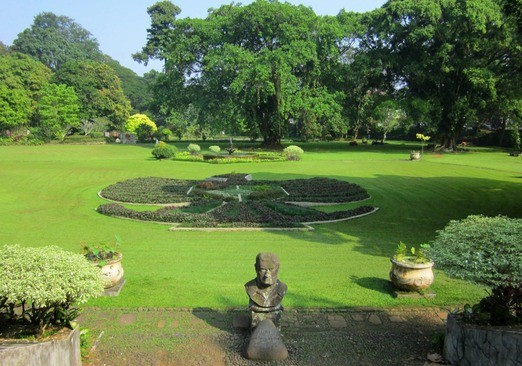Popular Reads
Top Results
Can't find what you're looking for?
View all search resultsPopular Reads
Top Results
Can't find what you're looking for?
View all search resultsEx-park heads flag new light show as 'commercialization' of Bogor gardens
Five former heads of the renowned Bogor Botanical Gardens have raised their concerns over planned commercial developments that they say supplants the national park's original purposes of conservation and scientific research.
Change text size
Gift Premium Articles
to Anyone

A
light show and revitalization project planned for the Bogor Botanical Gardens in Bogor, West Java, have sparked concerns that Southeast Asia’s oldest botanical garden has strayed from its original function as a conservation park and research center in favor of commercialization.
The concerns were first raised in an open letter dated Sept. 20 and signed by five former heads of the Bogor gardens, which was also circulated via messaging apps. It warned that the light show, dubbed “GLOW” and planned to be part of a night tour through certain areas, could endanger pollinators that live in the national park.
The letter also questioned the sustainability of recent infrastructure projects inside the gardens, such as replacing a stone footpath with a concrete path that would reduce the park’s natural catchment areas.
In January last year, the Indonesian Institute of Sciences (LIPI) partnered with event organizer PT Mitra Natura Raya to manage the commercial and promotional aspects of four botanical gardens under its management. Aside from the Bogor Botanical Gardens, the other three botanical gardens are located in Cibodas, West Java, Purwodadi, East Java, and Tabanan, Bali.
Dedy Darnaedi, who was among the former Bogor Botanical Gardens heads who signed the letter, confirmed the letter’s authenticity when The Jakarta Post contacted him in Bogor on Wednesday. He added that the letter was sent to the National Research and Innovation Agency (BRIN) in response to complaints they had heard in relation to the gardens’ current management.
"It seems that there has not been proper dialogue [over the plans], especially between senior workers at the botanical gardens and the newer management,” said Dedy, who was quick to point out that it was not wrong for LIPI to team up with the private sector in managing the gardens.
He stressed, however, that the partnership should not jeopardize the gardens' primary function as a conservation park.
“I’m not anti-privatization. During the colonial era, the Bogor Botanical Gardens was used to cultivate crops such as tea, coffee, cinchona trees and even oil palms. However, its purpose remains scientific and for [agribusiness],” Dedy said.
Read also: Bogor Botanical Gardens last bastion for flora
Established in late April, BRIN is to consolidate four national research institutions, including LIPI, as well as the research and development departments of all ministries under its authority by 2022.
BRIN head Laksana Tri Handoko insists that partnering with the private sector to manage the Bogor Botanical Gardens would support the park’s research activities.
“With the current arrangement, academics can focus on research [at the gardens] because they don’t have to handle the gardens’ day-to-day operations,” Laksana told the Post on Tuesday.
In a separate statement on Thursday, Yan Rianto, the acting research infrastructure and innovation deputy at BRIN, pointed to botanical gardens in other countries that also offered a program similar to GLOW, including the Singapore Botanic Gardens.
“As an innovative education and tourism program, GLOW took its inspiration from various botanical gardens in other countries that already offer night tours,” he said.
In the same statement, Mitra Natura Raya sales director Michael Bayu A. Sumarijanto said the light show was developed to raise awareness about conservation among the younger generation.
“GLOW offers educational content of the biota in the Bogor Botanical Gardens in the form of lighting, animated visuals, audio, direct experience, etc.,” he said.
Meanwhile, Sukma Surya Kusuma, the acting head of the LIPI Biomaterial Research Center, said the center was conducting comprehensive research to assess the impacts of developments in the vicinity on plant conservation efforts in the gardens.
Speaking at a discussion on Wednesday, IPB University science communication researcher Melani Abdulkadir-Sunito urged LIPI to exercise caution in opening the Bogor gardens to commercial activities that could potentially harm its ecosystem.
“We need to be careful and reconsider whether [internal] activities could burden the botanical gardens from the inside, as it already has to endure external burdens,” Melani said, referring to its location in the Bogor city center.
She also called on the government to protect the “integrity and authenticity” of the Bogor Botanical Gardens, particularly as it had proposed the Bogor Botanical Gardens for inclusion on UNESCO’s World Heritage list in 2017, which coincided with the gardens’ bicentennial.
In 2019, the Bogor Botanical Gardens was placed on the tentative list of World Heritage Sites.









